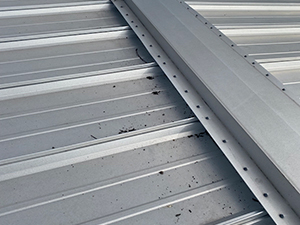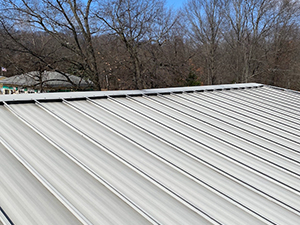
For commercial building owners in Hendersonville, TN, maintaining optimal efficiency in your property isn’t just a best practice, it is essential to staying competitive and sustainable. One often-overlooked strategy for boosting building performance lies overhead: your roof. Specifically, upgrading to or properly maintaining a commercial metal roof can be a critical step toward improving energy efficiency without compromising durability.
If you are considering roof improvements for your commercial property in Hendersonville, TN, and want expert insight on metal roofing options, contact Glick Roofing Systems today at (615) 265-0598 for a professional consultation.
Can a Commercial Metal Roof Lower Energy Costs?
Reflective Surface, Reduced Heat Gain
Metal roofing systems have a natural advantage when it comes to regulating temperature. Unlike darker traditional roofs that absorb heat, metal surfaces, especially those treated with reflective coatings or “cool roof” finishes, bounce a significant portion of the sun’s rays away from the building.
This thermal reflectivity can make a measurable difference in how hard your building’s HVAC system needs to work during the hot summer months common in Hendersonville, TN. By reducing the transfer of heat into the building, a metal roof can contribute to a more stable indoor environment, particularly important for facilities that house sensitive equipment, perishable goods, or large numbers of occupants.
Insulation and Ventilation Compatibility

While reflectivity addresses external heat, the internal temperature control of your building also depends heavily on insulation and ventilation. Metal roofs can be paired with rigid foam or fiberglass insulation systems that help regulate temperature from within. Ventilation options, like ridge vents or underlayment systems, can also be easily integrated into metal roofing, helping manage moisture and airflow to preserve both energy performance and structural integrity.
This ability to work in tandem with other energy-smart systems gives commercial metal roofs an edge over some traditional roofing types that may be more difficult or expensive to retrofit.
Durability Reduces Resource Waste
In commercial real estate, every system should contribute to long-term operational stability, and metal roofing excels in this area. Unlike traditional flat or shingled roofs, which may need frequent patching or full replacement every decade or two, a well-installed and properly maintained metal roof can last several decades with minimal upkeep.
The extended lifespan of metal roofing means fewer materials sent to landfills, fewer disruptions from recurring roof work, and less overall stress on your building’s envelope. When roofing systems hold up for the long haul, the building performs more consistently and efficiently.
Cool Roofing Standards and Compliance
Many commercial metal roofs meet or exceed standards set by programs such as ENERGY STAR or local green building certifications. These standards typically assess reflectivity, emissivity (how quickly a material cools down), and overall roofing system performance. While you don’t need to chase certifications for your roofing system to be effective, knowing your system complies with recognized benchmarks can help guide future decisions about energy-efficient improvements elsewhere in your building.
In climates like Hendersonville’s, where temperature swings are common, energy-smart roofing solutions can become a significant asset for maintaining comfort and efficiency.
Is a Commercial Metal Roof Right for You?
Commercial Metal roofs are suitable for a wide variety of commercial building types including:
- Warehouses and distribution centers
- Retail centers and shopping plazas
- Office buildings
- Educational and municipal facilities
- Industrial and manufacturing plants
That said, a full evaluation of your building’s structure, insulation levels, and operational needs is essential before proceeding. Factors like slope, existing materials, and roofing penetrations (vents, skylights, etc.) can influence the best course of action.
At Glick Roofing Systems, we help commercial property owners in Hendersonville, TN assess whether metal roofing is the right move—not just structurally, but also from an energy optimization standpoint.
Commercial Metal Roof Experts!
Your roof can either be a drain on your building’s performance or an asset that works in your favor. By investing in or upgrading to a commercial metal roof, property owners in Hendersonville, TN can support a more energy-conscious building operation—improving tenant comfort, protecting internal systems, and contributing to long-term sustainability goals.
To explore your options or schedule a professional evaluation, call Glick Roofing Systems at (615) 265-0598 today.
FAQ
Do all metal roofs offer the same energy benefits?
No. Energy performance varies based on the type of metal, color, and whether the surface has a reflective or “cool roof” coating. Consulting a roofing expert helps identify the right product for your needs.
Is a metal roof suitable for flat commercial roofs?
Yes. While metal is most commonly seen on sloped roofs, there are engineered metal panel systems and retrofit options available for low-slope and flat commercial roofs.
How often does a commercial metal roof need maintenance?
Though durable, metal roofs should be inspected at least once a year. Maintenance may include checking for loose fasteners, damaged seams, and signs of corrosion or ponding water.
Can I install a metal roof over an existing roof?
In some cases, yes. This is known as a metal roof overlay or retrofit system. However, the existing structure must be evaluated to ensure it can support the new load and meet code requirements.
How does metal roofing impact indoor temperatures?
Metal roofing with reflective coatings can reduce the amount of heat that penetrates the roof, helping to stabilize indoor temperatures and reduce the workload on your HVAC system.

